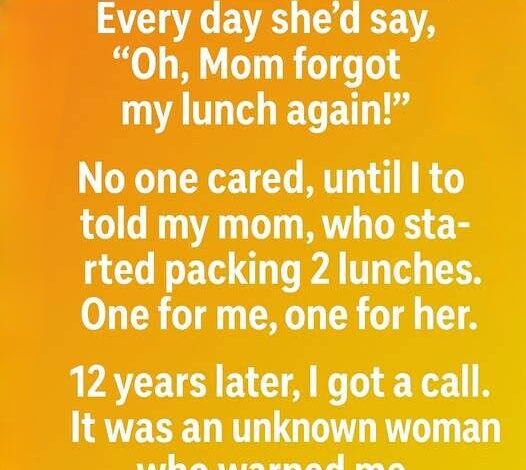It began with something small — the kind of moment most people rush past without noticing. There was a girl in my class who never brought a lunch. She didn’t complain, didn’t wander near the cafeteria hoping someone would offer her food. She simply sat down with that gentle, practiced smile, folding her hands in front of her like she wasn’t hungry at all.
Every day, kids tore open their lunches — crinkling chip bags, trading snacks, showing off bright lunchboxes. And she just watched, calm and quiet, as if being the only one without anything to eat was normal for her. Whenever someone asked if she’d forgotten her lunch again, she’d give the same soft laugh and say, “My mom forgot again.” She always said it lightly, but there was a small crack in her voice that made it clear she was used to going without.
That afternoon, I told my mom about her. I described the way she tried to disappear during lunch, the way she smiled so no one would feel awkward, how she made hunger look effortless. My mom listened quietly — the way she always did — and when I finished, she let out a soft breath and said, “We’ll pack an extra lunch tomorrow.”
No big speech. Just instinct.
The next morning, she slipped two sandwiches, two apples, and two juice boxes into my bag. “You’ll know who it’s for,” she said, zipping it closed.
At lunch, I sat beside the girl like always. My heart pounded for no logical reason — funny how offering kindness can feel more vulnerable than offering nothing. When I handed her the extra lunch, she froze. For a moment, she looked like she might refuse it, like accepting help was heavier than skipping another meal. Then she saw my smile, and something in her softened. Her shoulders relaxed. She whispered, “Thank you,” in a voice so small it almost disappeared.
That was the beginning.
From then on, my mom never missed a day. Some mornings she packed leftovers, sometimes homemade cookies, sometimes little surprises she’d baked just for us. She didn’t make a fuss about any of it. She simply kept packing two lunches, trusting me to put the extra one where it belonged.
Little by little, the girl opened up. She told me about her mom working two jobs, about nights when dinner was whatever they could stretch the farthest. She never complained. Never played for sympathy. She had simply learned how to go without.
But sitting beside me each day — eating, talking, belonging — she changed. She didn’t shrink as much. She didn’t pretend as hard. That empty seat next to me became hers. And those lunches became a small space where she didn’t have to act like hunger was normal.
Years passed. We went to different schools. Life drifted on, washing us into different routines, different towns, different futures. Eventually, she became one of those bright childhood memories — warm, distant, half-faded.
Then one evening, my phone rang.
The number wasn’t saved. I nearly ignored it. When I answered, a familiar voice said, “You probably don’t remember me… but I’ve never forgotten you.”
It was her.
Hearing the grown version of that quiet little girl stunned me. Her voice still carried that gentleness, but now it held confidence too — the kind you earn by surviving hard years.
She said she’d found my number through a mutual friend. “I’ve wanted to call you for so long,” she said. “Those lunches… they meant more than you know. Not just the food. You saw me.”
I sat there in silence, tears stinging my eyes. I had never understood how deep that kindness had gone. To me, it was simple: she needed lunch, and we had enough to share. But to her, it was proof she wasn’t invisible.
Then she told me something that froze me in place.
“Every week,” she said, “I donate lunches to kids at a shelter. I always think of you and your mom. You showed me what real kindness looks like.”
My breath caught. She told me about volunteering, about wanting to be the person for other kids that someone had once been for her. We talked for a long time — about her life, her dreams, her plans to start a meal program. I told her about my mom, who still packs too much food for every trip, still believes feeding people is a love language.
Before hanging up, she said, “Tell your mom her kindness didn’t stop with me. It kept going.”
When I told my mom, she paused, smiled softly, and said, “That’s what kindness does. It moves.”
She was right.
Those lunches were never charity. They weren’t grand gestures. They were simple acts of care — small, quiet, human. And those are the acts that ripple the farthest.
Most people think kindness has to fix everything to matter. It doesn’t. Sometimes it just gives someone enough warmth to get through one hard chapter, and that alone can change the direction of their life.
Even now, when I pack an extra sandwich or donate a meal, I think of that girl. I think of the way a simple lunch became a chain reaction — one small kindness stretching across years, touching people neither my mom nor I will ever meet.
That’s the truth: kindness doesn’t end. It travels. It grows. It circles back when you least expect it.
And sometimes, years later, it comes back in the form of a quiet voice saying, “Thank you for seeing me.”
